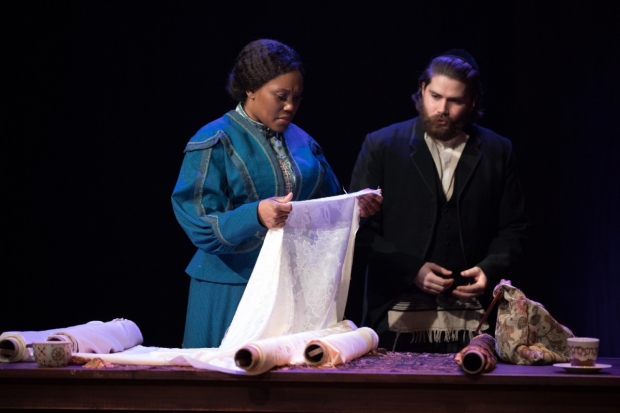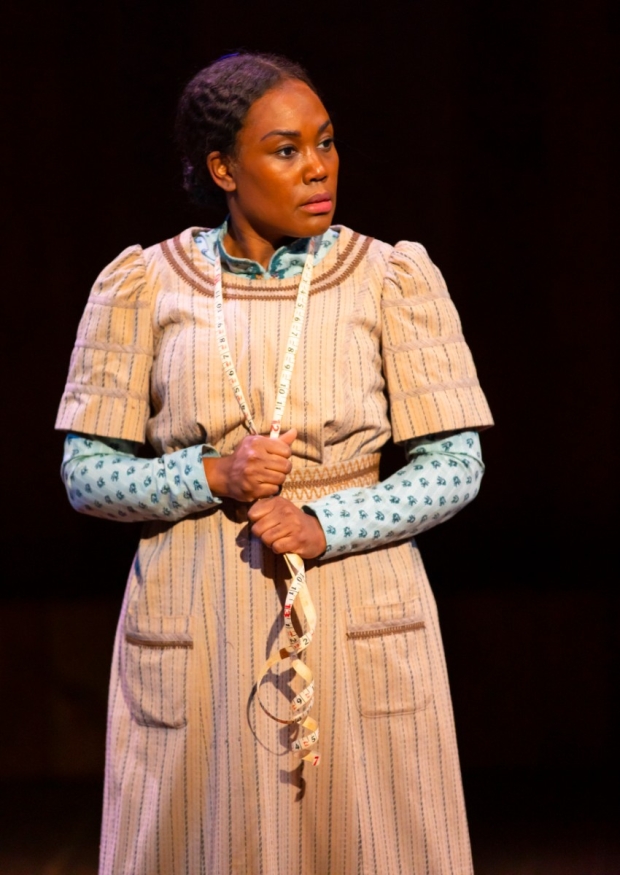Review: Intimate Apparel Brings Subtlety to the Operatic Tradition

(© Julieta Cervantes)
Lynn Nottage rarely writes stories on grand or global scales. Her two Pulitzer Prize-winning works hardly venture past the confines of four walls — her 2009 play Ruined trapping the pressure of the civil war-ravaged Democratic Republic of the Congo inside Mama Nadi's poolroom, and her 2017 drama Sweat turning up the temperature on a group of frustrated factory workers at the local watering hole in Reading, Pennsylvania. Intimate Apparel (which has become one of Nottage's most-produced plays since its 2003 world premiere at Baltimore's Center Stage and 2004 off-Broadway premiere at the Roundabout) shares this signature — for lack of a better word, intimacy. But also like Nottage's other works, this insular story of Black seamstress Esther Mills in turn-of-the-20th century New York City carries currents of emotion worthy of operatic expanse.
Of course, just because a story feels operatic does not mean it can instantly and effortlessly assume the form of an opera — making Intimate Apparel's transfiguration at Lincoln Center's Mitzi E. Newhouse Theater all the more impressive. Directed by Bartlett Sher as more a chamber piece than anything Wagnerian (the performers are accompanied by only a pair of pianos, conducted by Steven Osgood), Intimate Apparel in its new musical form is allowed to keep its delicacy while also cutting enough seams to let its content soar to the rafters.

(© T. Charles Erickson)
Fair warning to those who prefer finely detailed dialogue to the broad strokes of an opera's libretto: You may find yourself wistful for Nottage's original play. The text is pared down to its bare essentials to allow both literal and metaphorical space for composer Ricky Ian Gordon's score to do its work. And while some of Nottage's luscious verbiage is lost, Gordon's music successfully plumbs the depths of the original piece. Composed like a collection of art songs, the score is peppered with sounds of ragtime and klezmer (musical spaces I wish Gordon had let us sit in longer), and provides a fitting framework for the story that fans of Intimate Apparel enter the theater anticipating (Sher's design team, with lighting by Jennifer Tipton, sets by Michael Yeargan, and costumes by Catherine Zuber, infuse the sepia-toned environment with the lushness of a painting).

(© T. Charles Erickson)
Kearstin Piper Brown, in a stunning soprano performance, stars as Esther, an illiterate daughter of slaves who moved north to New York City at 17 for opportunity. She lives in a boarding house run by Mrs. Dickson (a warm and inviting performance by Adrienne Danrish) and sews lingerie for a clientele that ranges from wealthy white women like Mrs. Van Buren (Naomi Louisa O'Connell) to Black sex workers like Mayme (Krysty Swann). For 18 years, Esther has pragmatically socked away money she plans to use to open her own beauty parlor — a place where Black women will receive the pampering usually reserved for white women. She is an entrepreneur in the age of sweatshops and factories. And yet, when one George Armstrong (Justin Austin) presents the opportunity for Esther to have a husband who could take her away from the boarding house — the typical trajectory for women who pass through Mrs. Dickson's — all of her business plans take a backseat to the promise of long-absent tenderness.
Esther meets Armstrong through a series of beautifully written letters he sends her while working on the Panama Canal. She can't write her own responses, so she enlists the help of Mrs. Van Buren, a neglected wife in desperate need of her own romantic make-believe, to help her write her suitor back (O'Connell's performance as Mrs. Van Buran is grounded and revealing, even as she shatters glass with her voice). Just as Esther crafts a fantastical version of herself in these ghost-written notes, George also turns out to be much different than promised when he arrives in New York to take Esther as his wife. In Act 1, George is a dream. In Act 2, he is a harsh reality. And as Austin's powerful baritone shifts from a sultry siren call to a threatening growl, many more of Esther's hopeful fantasies begin to tragically melt away.

(© Julieta Cervantes)
In place of the melodramatic death scenes that button classics like La Bohème or La Traviata, Intimate Apparel gets its operatic heft from Esther's slow march toward obscurity. Ultimately, all the people meant to love Esther fall short in jarring ways (Yeargan furnishes each of the spaces occupied by these characters with a distinct bed or chaise like an ever-elusive promise of closeness). The only person with whom Esther shares truly intimate moments is the one she has no obligation to serve: a Jewish fabric salesman by the name of Mr. Marks (Arnold Livingston Geis, conveying gentle care through his tenor voice); he, like Esther, sees the beauty in his wares and the delicate garments Esther makes from them.
The struggle to be seen in a world tailor-made to render you invisible is Esther's battle, and Brown performs that fight with a dignity and grace befitting this new, infinitely more vocal version of Nottage's piece. No one will be struck down by tuberculosis or burned on a pyre or consumed by the flames of hell. But as you march through Esther's story of ambition, fortitude, and longing for love, only to see her etched in history as "unidentified Negro seamstress," you'll agree it's an ending worthy of operatic tragedy.

(© T. Charles Erickson)










